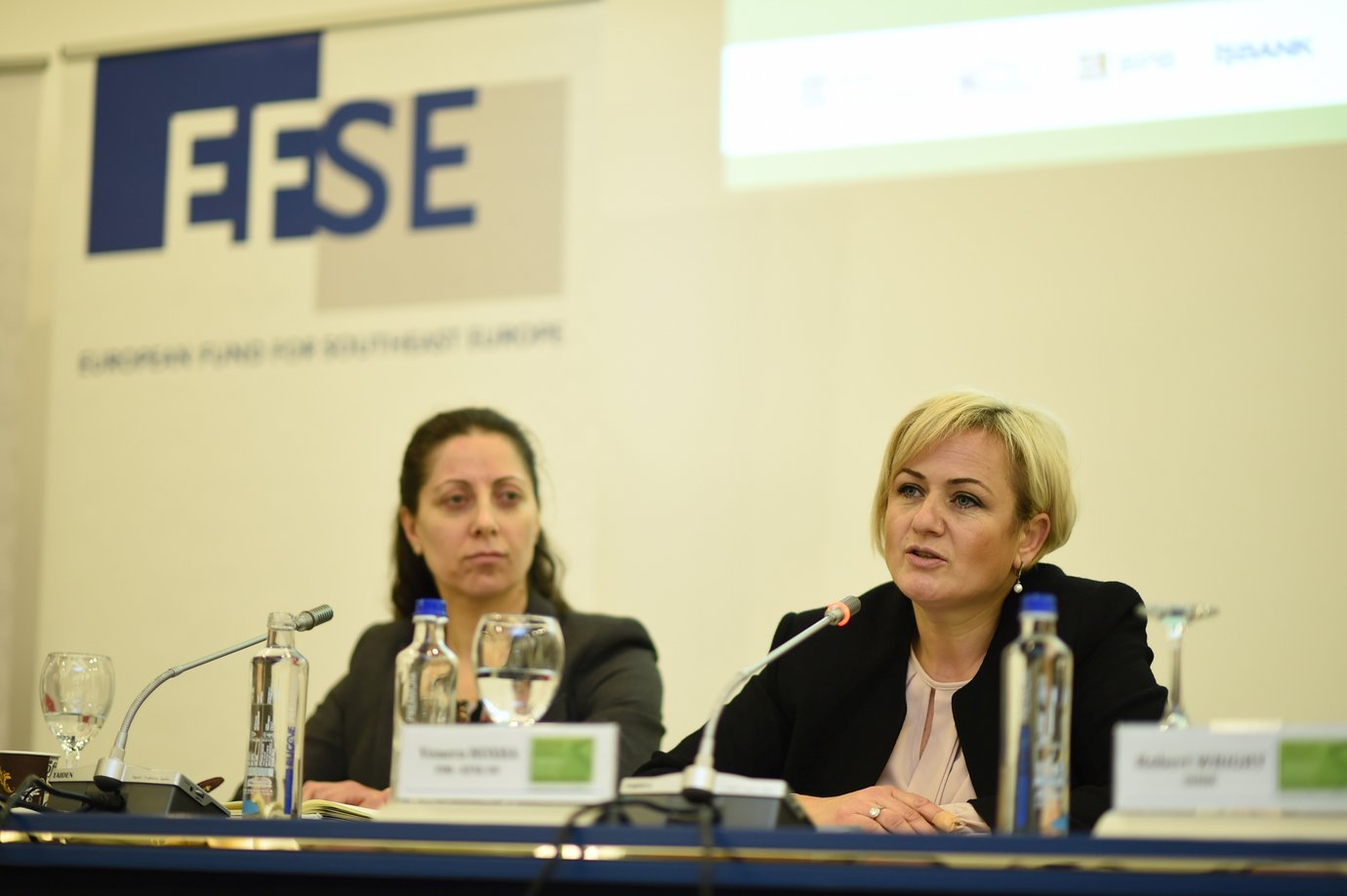Frankfurt am Main, Germany and Prishtinë, Kosovo, 8 November 2016 - A study shows that Kosovo’s banks have applied international best practices to their ongoing digitalization process to vastly improve retail services, resulting in quick, easy, cost-free and 24-hour access to accounts and allowing customers to conduct transactions wherever they have internet access.
The study was unveiled at the first Annual Banking Conference of Kosovo, which focused on digital services and was organized by the Kosovo Banking Association (KBA) in cooperation with the Development Facility of the European Fund for Southeast Europe (EFSE DF). The KBA initiated the study, which was sponsored by the EFSE DF and carried out by the Center for Strategic and Social Research (STRAS).
The study’s findings on sector digitalization and its effects serves as a reminder of how the application of information technology in the banking system creates opportunities and advantages for banks and their clients, the residents of Kosovo.
The conference where the study results were revealed featured representatives from the Government of Kosovo, the Central Bank of the Republic of Kosovo and commercial banks, microfinance institutions, non-banking organizations and various business and industry associations.
In his opening remarks, Petrit Balija, executive director of the KBA, emphasized that commercial banks in Kosovo are making continuous investments to increase and facilitate access to banking services. This is becoming possible due to the great support of many stakeholders who have drafted developmental strategies that are leading to the reduction of the use of cash and the increased use of digital and electronic banking services in Kosovo. In particular, he expressed special thanks to the EFSE DF for supporting the study and cooperating in the organization of the event.
Central Bank of Kosovo Deputy Governor Fehmi Mehmeti told attendees the banking system in Kosovo continues to be stable and liquid. He explained that the growth in the credit sector has been encouraging and shows the involvement of banks in supporting economic growth.
Ibrahim Rexhepi, the Executive Director of the Center for Strategic and Social Research (STRAS), served as moderator for a discussion on the study’s results. Panellists included KBA Vice-Chairman Robert Wright, Central Bank of Kosovo Deputy Governor Mehmeti, Deputy Minister Besa Zogaj-Gashi from the Ministry of Economic Development, ProCredit Bank Kosovo Board Member Eriola Bibolli, and Venera Hoxha, a representative of Finance in Motion, which advises the EFSE DF.
"All banks have already engaged in digitalization and offer clients mobile banking services through mobile applications and text banking. To reach this level, banks have prepared the entire legal and institutional framework, as well as a high level of monitoring,†Rexhepi explained.
To illustrate this development, he noted that in 2015, Kosovo was home to nearly 188,000 active e-banking accounts – 18% more than in 2014 – through which 2.3 million transactions were made. This represented EUR 5.7 billion in turnover, a 36.5% rise from the year earlier.
During the panel discussion, KBA Vice-Chairman Wright said Kosovo has been very successful in applying best practices in the digitalization of banking services, but there is still much to be done.
Deputy Central Bank Governor Mehmeti said the central bank is doing its part to improve the country’s banking environment by "working to establish the National Agency of Payment Processing, which would shorten the transaction processing time and reduce costs.â€
Finance in Motion’s Venera Hoxha (top photo, right) noted that the achievements in Kosovo are a good start compared to other countries of the region. "Considering there are one million internet users in Kosovo and only 200,000 e-banking customers, there is a still lot of room for the development of digital banking.â€
About the EFSE DF
The Development Facility of the European Fund for Southeast Europe (EFSE DF) was created in 2006 to support the fund’s development finance mandate. It deploys effective, targeted and innovative technical assistance to maximise the impact and extent of the Fund’s development finance mandate in target countries. The services of the facility encompass capacity building and training, financial sector support and applied research with the aim to strengthen the internal capacities and operations of the fund’s partner lending institutions.
The facility operates independently from the fund in a fiduciary arrangement under Luxembourg law. The Development Facility Committee, comprising members nominated by KfW Development Bank, the Swiss Agency for Development and Cooperation, the development bank of Austria OeEB, and the Dutch development bank FMO, is responsible for assessing and approving all project proposals and providing strategic guidance to the facility.
About the European Fund for Southeast Europe
The European Fund for Southeast Europe (EFSE) was initiated by KfW Development Bank with the financial support of the German Federal Ministry for Economic Cooperation and Development (BMZ) and the European Commission. It aims to foster economic development and prosperity in 16 countries in Southeast Europe and the European Eastern Neighbourhood. As access to finance is a key to successfully developing micro, small and medium enterprises (MSMEs), the fund seeks to improve the ability of local financial sectors to ensure adequate and sustainable financing. Although it offers funding for private households in the form of home improvement loans, the EFSE primarily provides long-term finance for MSMEs. Funds are channelled to these loan customers through local partner lending institutions.
Initiated by KfW in 2005 from four multi-donor programs under its management, the EFSE was the first public-private partnership of its kind and the first privately managed fund in development finance to leverage private funding for MSME finance in the target region. Oppenheim Asset Management Services S.à r.l., Luxembourg acts as the EFSE’s Fund Manager and Finance in Motion GmbH, Germany as Advisor.
About KBA
The Kosovo Banking Association (KBA) represents the banking industry in Kosovo by cooperating with the Government, the Central Bank of the Republic of Kosovo, International organizations and civil society, the media, and the public opinion. The aim of KBA is to support a healthy banking system and open and fair competition as well as financial education and literacy for banking clients, which promotes the long-term economic development in Kosovo. The Kosovo Banking Association facilitates the cooperation between banks while offering a single platform for discussion of new initiatives; identifies and reviews legal and regulative initiatives; coordinates common activities for banking industry and promotes banking activities in front of the wide audience. Established in 2002, the KBA is a main reference point related to the issues that deal with the banking sector in Kosovo. KBA represents nine commercial banks: Banka Ekonomike, Banka Kombëtare Tregtare, Banka për Biznes, IsBank, NLB Prishtina, ProCredit Bank, Raiffeisen Bank, TEB Bank and Ziraat Bank. KBA is the voice of banking industry in Kosovo. For more information, please visit www.bankassoc-kos.com.
Media contact EFSE
Eric Culp
Press Officer
e-mail: press@efse.lu
Tel: +49 (0)69 271 035-307
Get in touch
Interested in learning more about how the fund works, or seeking partnership opportunities? Contact an EFSE representative today.


